Britain’s Covid outbreak is still flattening off, according to official statistics that today dismissed hopes that the worst of the third wave was over.
Department of Health bosses posted another 31,808 cases today, up 7 per cent on the 29,622 recorded last Friday.
The number of victims dying with the virus — a measure which lags weeks behind infections — also increased by 35.3 per cent, jumping from 71 last week to 92.
But hospital admissions, which always turn before fatalities, continue to fall. There were 778 people hospitalised with Covid on Monday, down 16.2 per cent on the previous week.
The figures come as leading scientists warn achieving herd immunity against Covid is looking ever-increasingly impossible, with neither vaccines nor natural infections triggering ‘perfect’ protection.
Professor Paul Hunter, an infectious diseases expert at the University of East Anglia, said immunity against SARS-CoV-2 — the virus that causes Covid — is likely to be short-lived.
But separate official data today offered a glimmer of hope, revealing England’s shrinking Covid outbreak towards the end of July was real and marked the first time cases had genuinely fallen since the third wave took off.
No10’s top scientists claimed the R rate — which shows how quickly the coronavirus is spreading — has dipped below one for the first time in 12 weeks. The UK Health Security Agency said the reproduction rate is between 0.8 and 1.1. For comparison, last week’s figure stood at between 1.1 and 1.4.
Meanwhile, random swab-testing data — used by ministers to keep tabs on the size of the outbreak — estimated the number of infected people has also dropped for the first time since May.
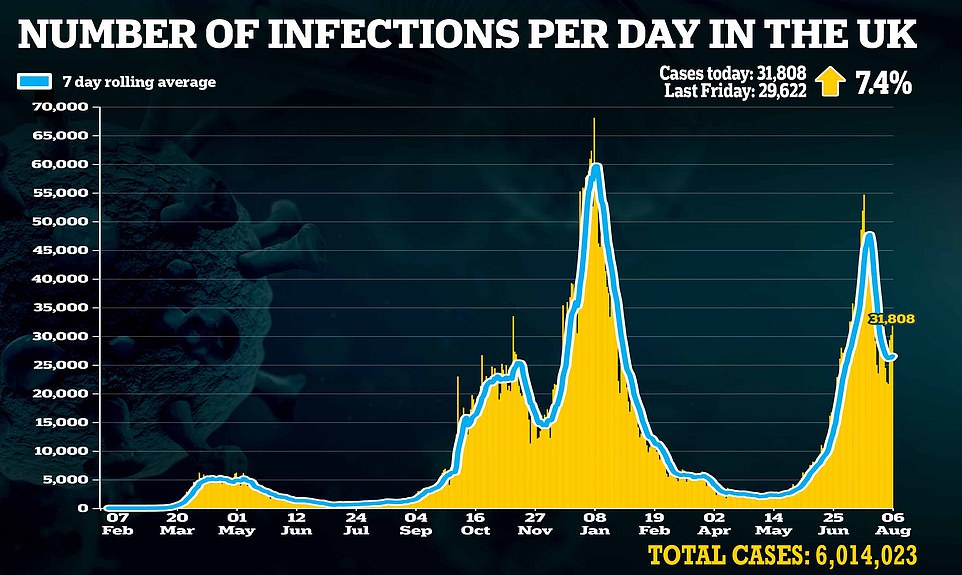
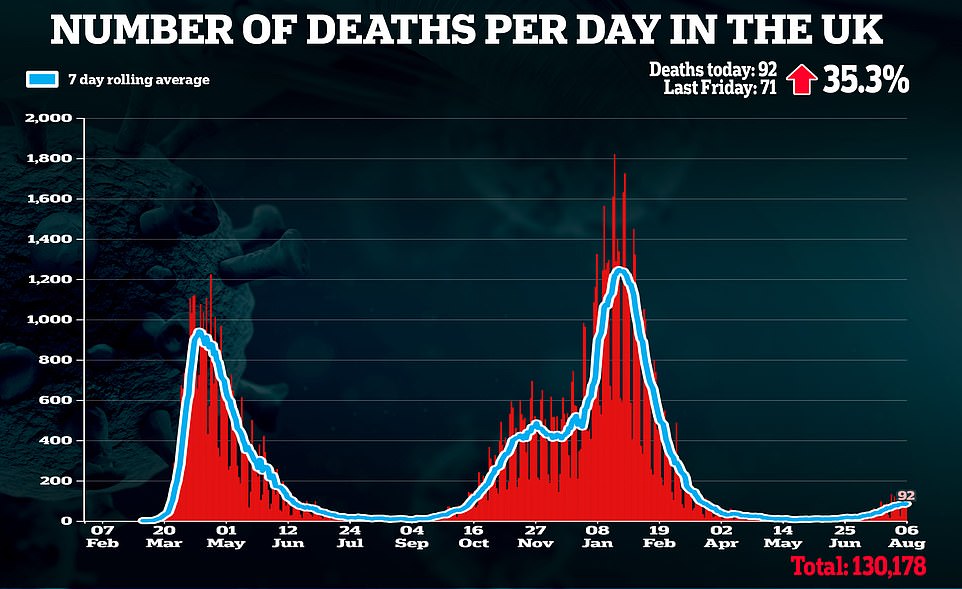
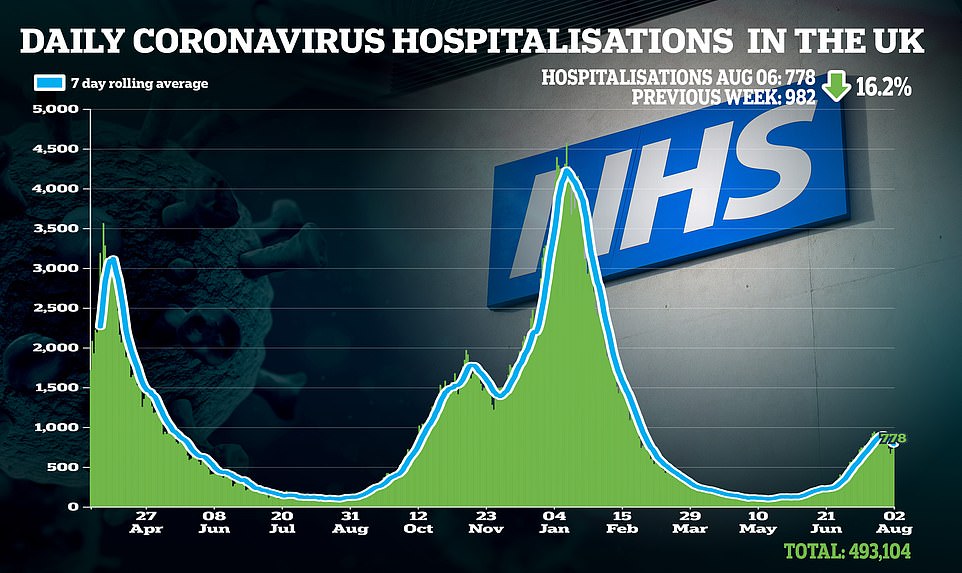
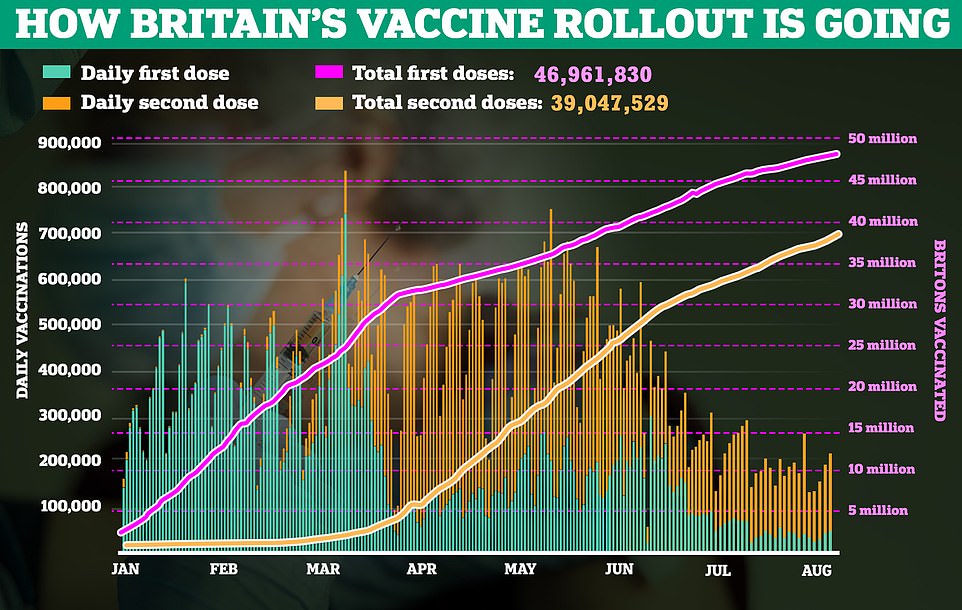
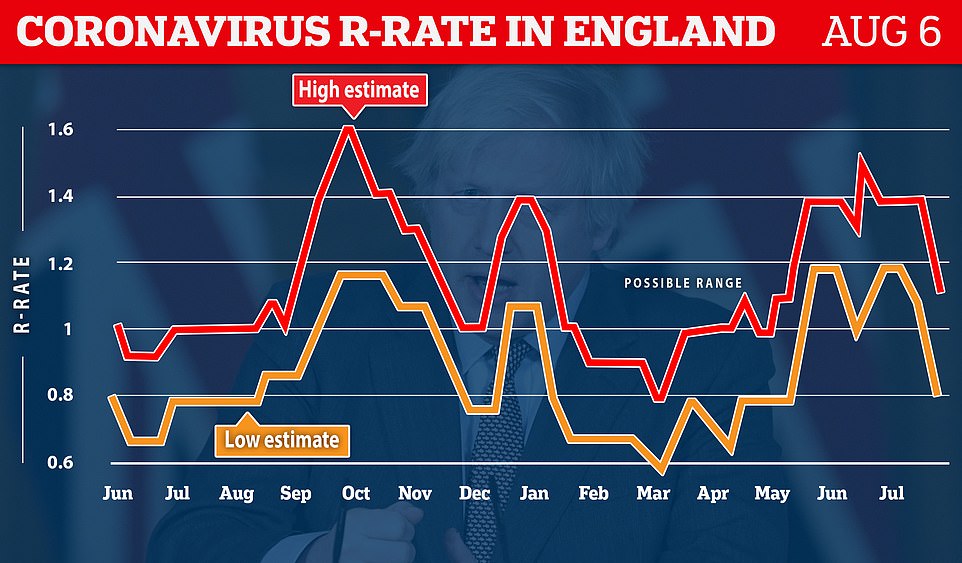
SAGE estimates the R rate — which shows how quickly the virus is spreading — is between 0.8 and 1.1. It means that, on average, every 10 people infected will infect between 8 and 11 other people
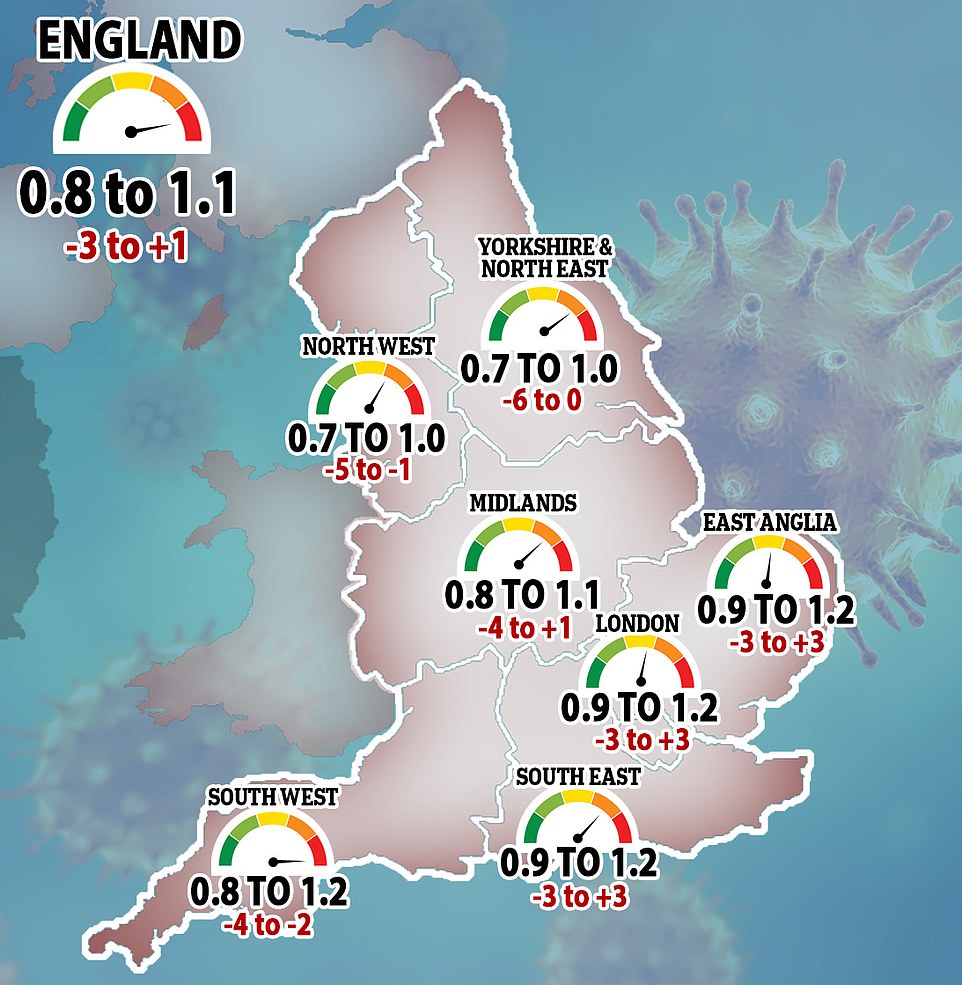
The rate is lowest in the North East and Yorkshire, as well as the North West, with both areas having a rate of around 0.7 to 1
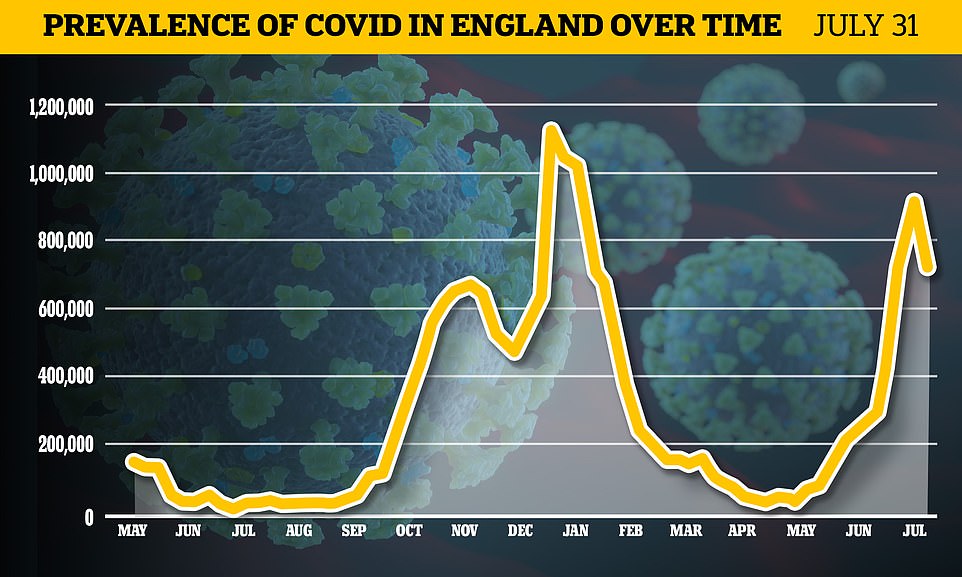
Office for National Statistics (ONS) data released today shows the number of people infected with the virus fell from 856,200 to 722,300 in the week ending July 31
Nearly 170 neighbourhoods are still yet to fully protect 60% of over-50s
Nearly 170 neighbourhoods across England have still not fully vaccinated two-thirds of over-50s against Covid, MailOnline can reveal.
Scientists warned our analysis — based on official statistics of the country’s 7,000 districts — shows there are huge pockets of the population still vulnerable to the virus.
Ministers aimed to give all in the age group two jabs in order to protect them from the rampant spread of the Delta variant ahead of restrictions being eased back on July 19 ‘Freedom Day’.
But NHS England figures, which go up until August 1, show 29 neighbourhoods across the nation have not yet reached more than 60 per cent of people aged 50 and over.
Some 169 have only reached two thirds of the most vulnerable age groups, who were prioritised for the vaccine and have been eligible since March 17.
In theory, all could have been fully-jabbed now, given the 12-week spacing gap between doses, which was later shortened to eight weeks to help combat the rise of the now dominant mutant strain.
Overall, 2.5million over-50s (11 per cent) have not yet got their second jab and 2million haven’t had their first (nine per cent).
Harehills South in Leeds has reached the fewest over-50s, with just 813 of the 1,562 living in the area receiving their second dose — 52 per cent of the population.
For comparison, 22 areas have double-jabbed more than 96 per cent of their over-50s, with Morpeth South and West in Northumberland leading the way (96.6 per cent).
Experts warned vulnerable people who have not yet been vaccinated are ‘just as much risk of severe disease and death as at any time during the pandemic’.
Even though one jab offers some protection against severe illness, two doses are much stronger.
Professor Paul Hunter, an infectious disease expert at the University of East Anglia, told MailOnline NHS hospitals in the areas lagging behind could still face huge pressures this winter.
Most experts believe there will be another wave of Covid in the colder months.
Professor Hunter said: ‘The important message is that you do not get herd immunity as the virus can still spread even amongst fully vaccinated individuals.
‘So anyone who has not been vaccinated will get infected with the SARS-CoV-2 virus at some point and given that society is now opening up and that we now have the very infectious Delta variant that won’t be long.
‘If you have not been vaccinated and have not yet had a natural infection, then you at just as much risk of severe disease and death as at any time during the pandemic.’
Advertisement
It comes as:
MailOnline analysis showed almost one in a hundred people have died from Covid in England’s worst-hit neighbourhood;Public Health England figures suggested fully-vaccinated people who catch Covid really may be just as infectious as the un-jabbed; The first healthy 16 and 17-year-olds received their Covid vaccines, barely two days after the country’s oldest teenagers were told to get jabbed; MailOnline revealed nearly 170 neighbourhoods across England have still not fully vaccinated two-thirds of over-50s against Covid;Official data showed the number of venue check-ins with the NHS Covid app fell by 65 per cent last week, prompting fresh hope’s England’s pingdemic may be nearing it end; Optimism for the future rose to a pandemic high with more people than ever before believing the Uk will come out the other sider stronger;An anti-vaxxer nightclub died of Covid after mocking people for getting the ‘experimental’ vaccine and warning of a ‘big pharma’ conspiracy in hundreds of Facebook messages.
Today’s infection figures take the average number of new cases daily to 26,513.
This up slightly on yesterday’s seven-day average (26,201), but down on the week before.
Britain’s total infections have now risen up to 6,014,023, while 130,178 people who have tested positive have lost their life to the virus since the start of the pandemic.
Just under 47million adults in Britain (88.8 per cent) have now had a jab after another 35,500 first doses were dished out yesterday.
And 39million (73.8 per cent) are fully protected after NHS staff and volunteers put 172,692 second doses into people’s arms.
When enough people in a population are immune to a pathogen — meaning they are unable to catch and pass it on — to stop it circulating increasingly, herd immunity is achieved.
Countries are desperate to reach the elusive target because it would inevitably bring down infection levels, helping life return to normal.
But various factors stand in the way of the target, researchers warned today.
Scientists believe immunity will be short-lived because protection from other seasonal coronaviruses only lasts for around two years.
For this reason, even if the UK was to break past the barrier and reach herd immunity, it would likely only last a short period of time.
Instead, it will keep it at an endemic level — where a disease is regularly found among the population but is not harmful enough to impact on society.
It came as the R rate estimate fell today from last week, when experts estimated it to be between 1.1 and 1.4.
It is lowest in the North East and Yorkshire, as well as the North West, with both areas having a rate of around 0.7 to 1.
Rates are highest in the East of England, South East and London but are still below one in the lower estimates, with all three regions believed to be around 0.9 to 1.2.
The R rate is, however, a lagging indicator and does not reflect the situation currently. Instead, it paints a clearer picture on how quickly the virus was spreading three weeks ago.
Ministers once put the R rate at the heart of their Covid battle plan. But it is now less crucial because experts care more about hospitalisation and death rates, given the country’s massively successful vaccination roll-out.
The Office for National Statistics claimed 722,300 people were infected on any given day in the seven-day spell ending July 31 — the equivalent of one in 75 people. This marked a 15 per cent drop on the week before, when the toll was upwards of 850,000.
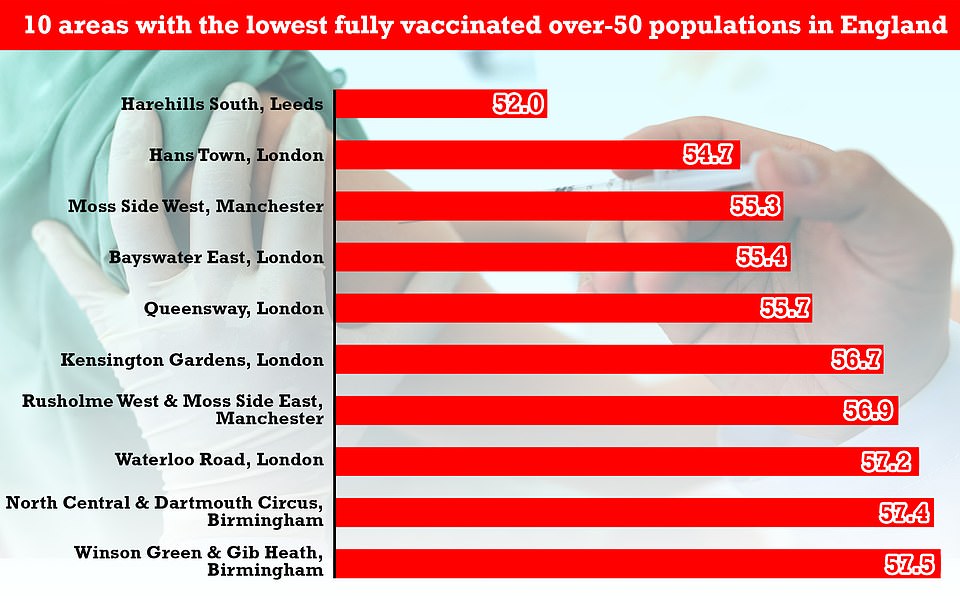
Nearly 30 areas in England have not fully vaccinated their over-50 populations against Covid, official statistics have revealed as experts warn there are huge pockets of the population still vulnerable to the virus. Graph shows
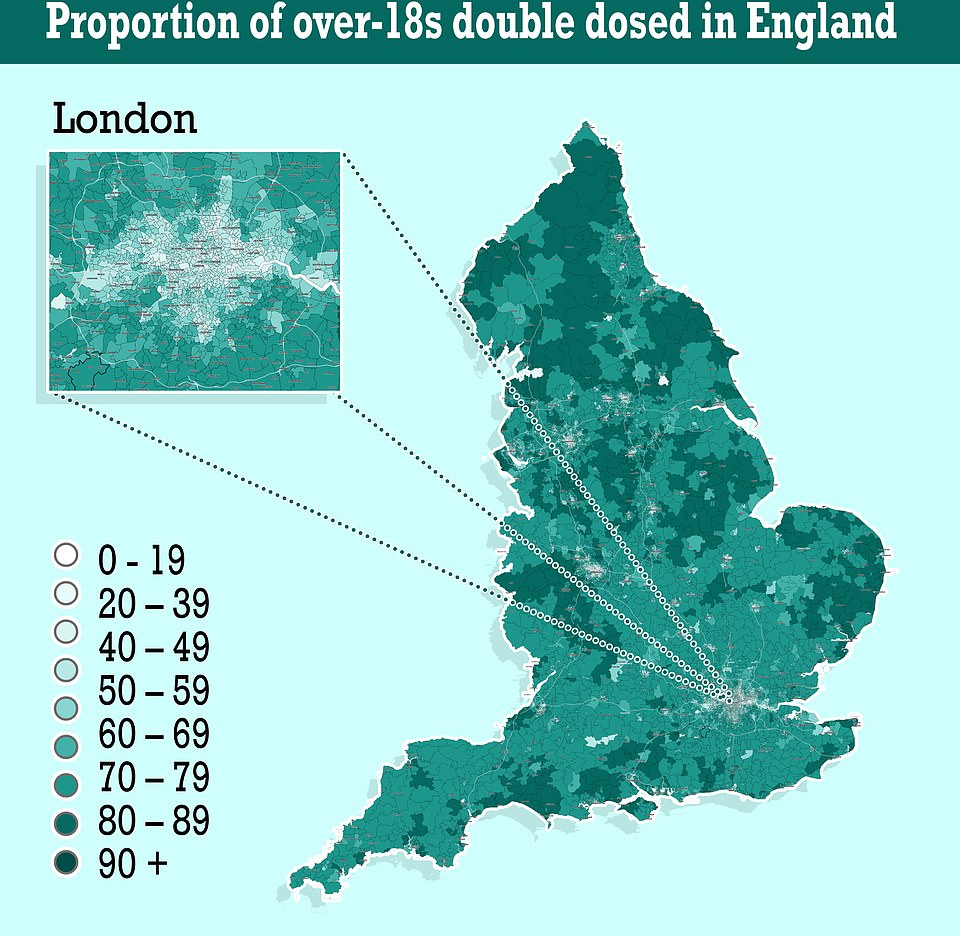
Harehills South in Leeds has reached the fewest over-50s, with just 813 of the 1,562 living in the area receiving their second dose — 52 per cent of the population. Map shows: The proportion of adults who have had both Covid vaccine doses
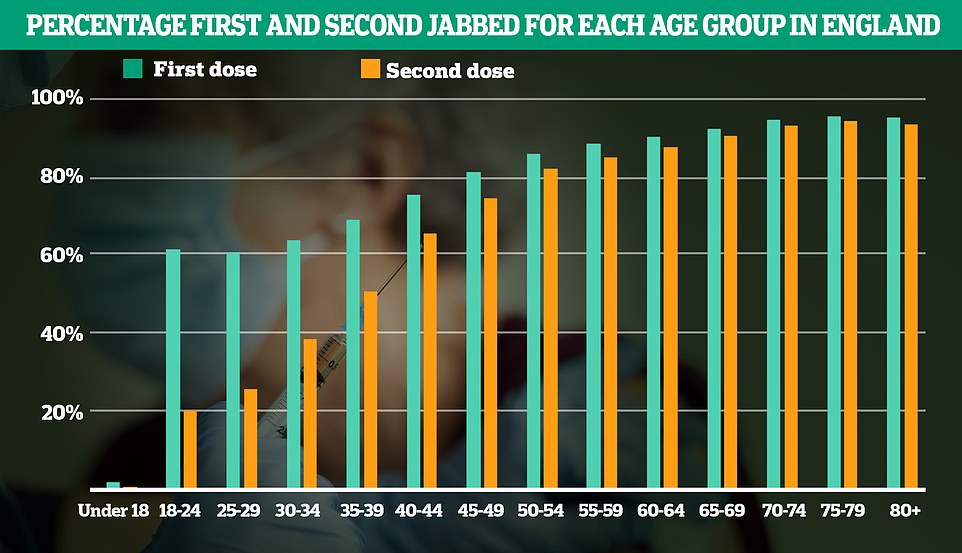
Overall, 2.5million over-50s (11 per cent) have not yet got their second jab and 2million haven’t had their first (nine per cent)
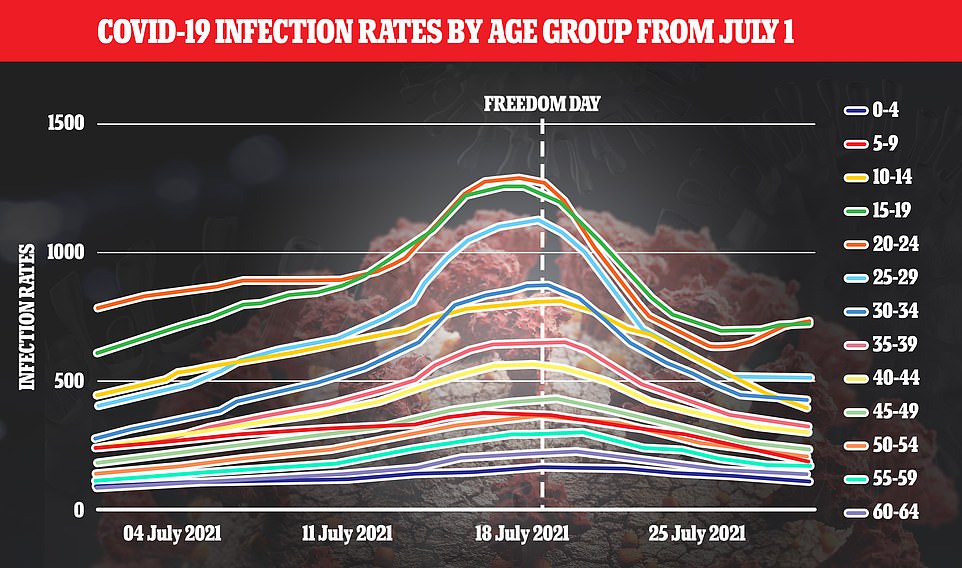
Covid cases are rising among adults in their early twenties and the oldest teenagers in England, and are static among adults in their late twenties. Experts said this could be due to Freedom Day easings and the long daylight hours encouraging more socialising. Younger age groups tend to do more socialising than older age groups
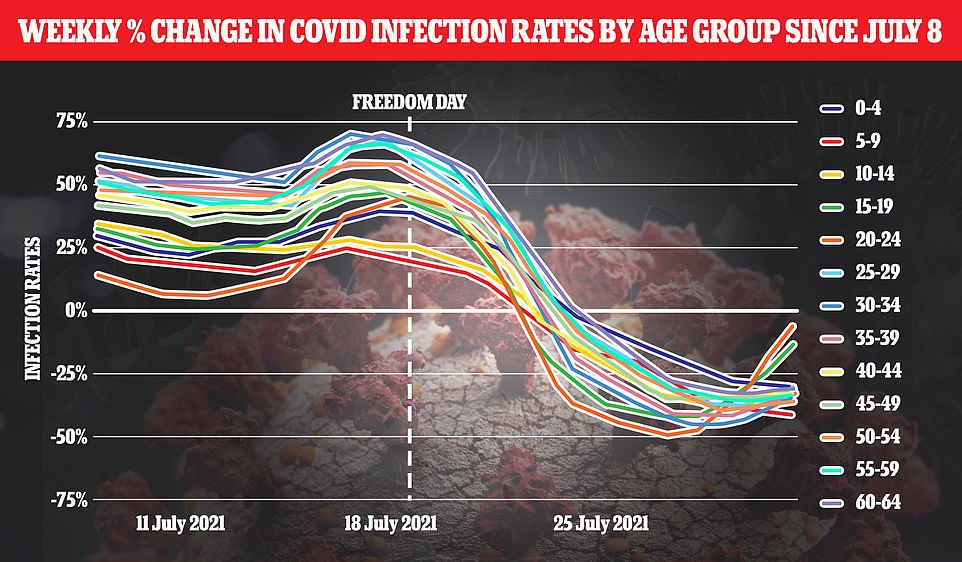
Covid cases are still dropping week-on-week in all age groups, but the rate of decrease has slowed considerably among adults in their early twenties. It could switch to a rise in cases in the coming days
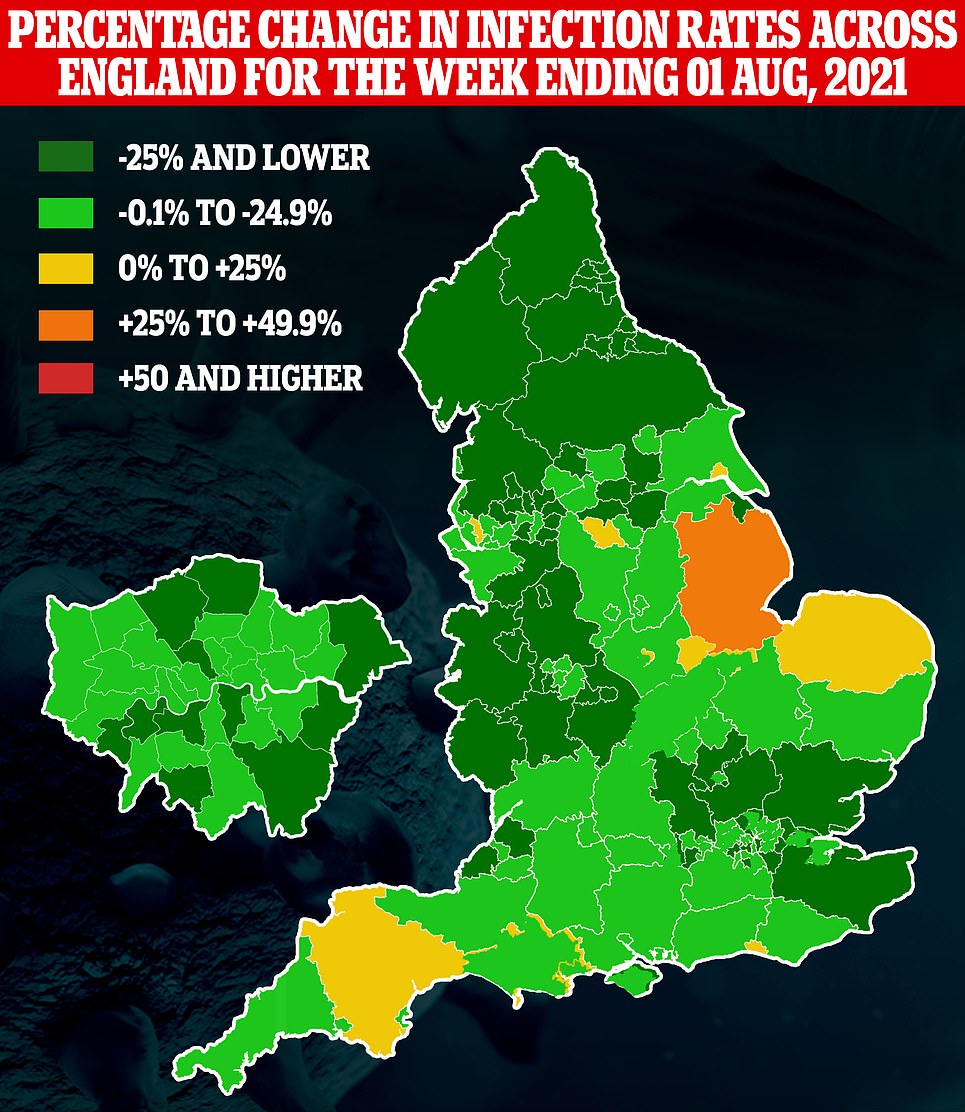
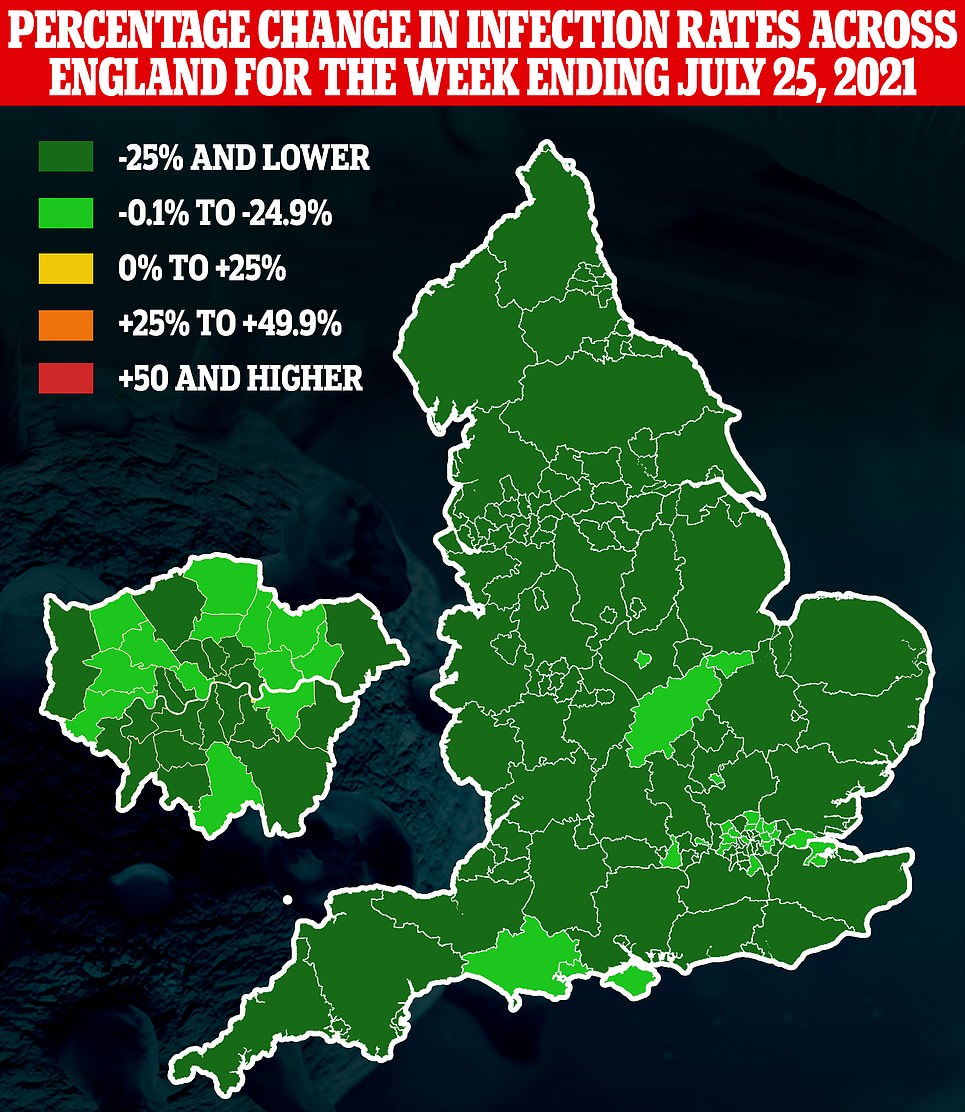 ‹ Slide me ›
‹ Slide me ›
Covid cases in England fell in all but 12 of the country’s 149 local authorities last week, Public Health England data showed. The slowdown comes as experts say the data will begin to reveal the impact of July 19 lockdown easings
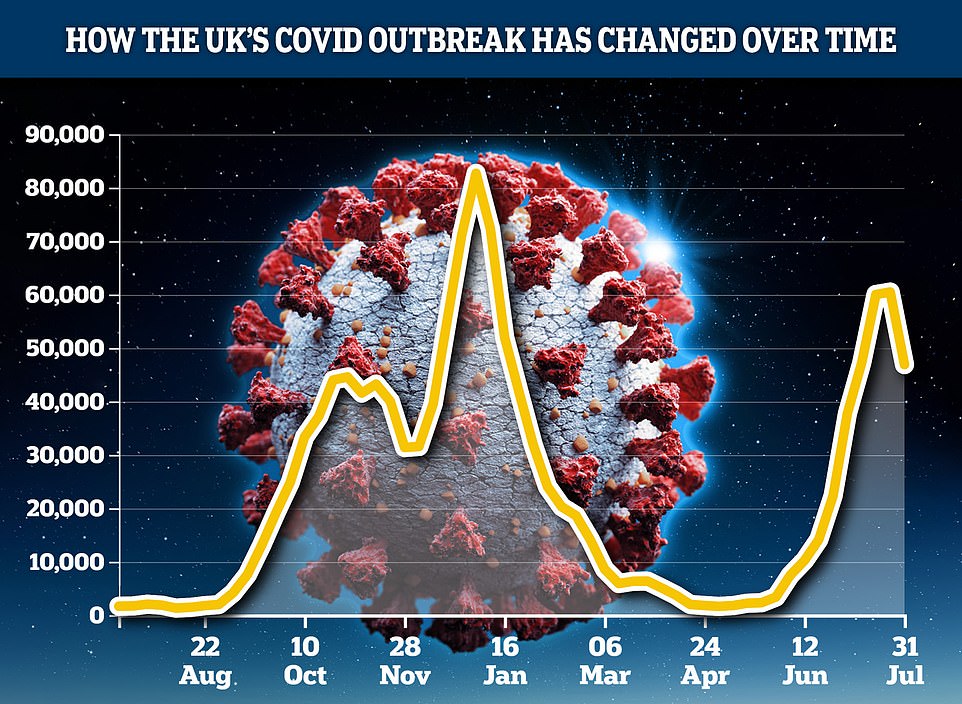
The Covid Symptom Study estimated cases fell by almost a quarter last week, after saying they had plateaued. It estimated 46,905 people are now catching Covid every day, down from almost 60,000 previously
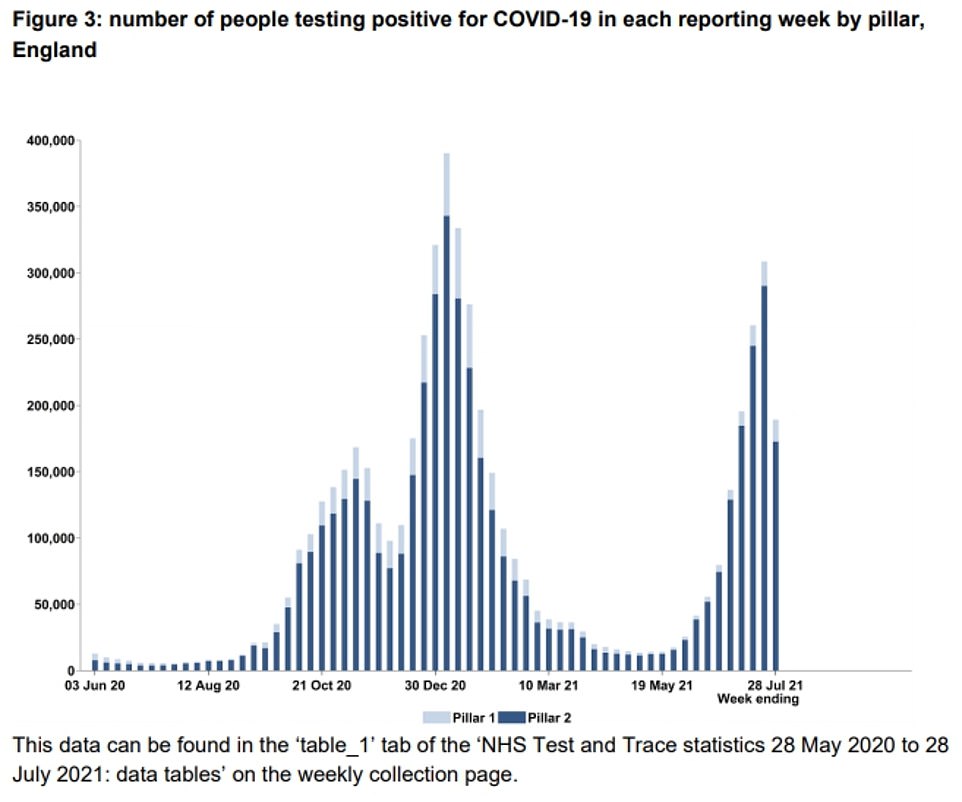
Test and Trace data showed Covid cases dropped by almost 40 per cent a week ago, in yet another sign the third wave has peaked. They said 189,232 Britons tested positive for the virus over the seven days to July 28
Is pingdemic mayhem FINALLY easing? Number of venue check-ins with the NHS Covid app fell by 65% last week
England’s ‘pingdemic’ chaos may finally be easing, according to official data which revealed the number of venue check-ins with the NHS Covid app fell by 65 per cent last week.
NHS statistics released yesterday showed the number of venue log-ins using the software dropped from 6.6million to 2.3million in the seven days ending July 28.
People are no longer required to use the app to check into venues since restrictions were lifted on July 19, but the trend gives an indication in the fall in usage.
Thousands of people have deleted the app in recent weeks to avoid the alerts, which tell people they have been in close contact with someone who had tested positive for coronavirus. But its ‘pings’ are merely guidance and not legally enforceable, unlike instructions from Test and Trace call handlers.
The NHS figures also revealed 395,971 self-isolation pings were sent in the seven days ending July 28 — down 43 per cent from the record-high 690,129 the week before.
But the drop was mainly fuelled by the fall in actual cases, given the tweak to make the app less disruptive didn’t kick in until the start of August.
In total, 950,000 quarantine alerts were dished out across the week – compared to rates of 1.5million during the most chaotic parts of the third wave. Nearly 190,000 people tested positive and 360,000 of their close contacts were tracked down.
It marks a steep turn in the direction of the self-isolation mayhem, which sentenced millions to house arrest and left supermarket shelves empty, pubs closed and trains cancelled.
Earlier this week health chiefs announced that the app was being updated so fewer contacts will be instructed to isolate. It now only finds close contacts from up to two days before infected people tested positive. Previously, it had trawled through five days of a user’s Bluetooth history.
Advertisement
The figures confirm the drop in the Government’s daily figures seen towards the end of July were genuine. Some academics warned the trend was fuelled by a lack of testing and people not wanting to get tested to avoid being caught up in the ‘pingdemic’.
But both the R rate and ONS weekly surveillance data are lagging indicators, reflecting the country’s situation up to three weeks ago.
Around 1.32 per cent of people in England had the virus on any given day in the most recent week data is available for.
The figure was higher than in Wales (0.43 per cent) and Scotland (0.82 per cent) but lower than in Northern Ireland (1.87 per cent).
Professor Hunter said: ‘The latest report from ONS provides further confirmation that infection rates really are falling in the UK.
‘In Northern Ireland however cases are still rising. The fall has been most notable in younger age groups.
‘The percentage fall was not as great as we saw in case numbers but this was largely due to the fact that the ONS study reports on PCR positives and people who become positive can remain so for more than two weeks so there will always be a lag in decline identified by ONS and by clinical sampling.
‘Whether this decline will continue or reach an equilibrium before schools return in September is not yet clear. We may see numbers remaining around the level they are at now.’
The Government agency’s estimate today was based on swabs of more than 100,000 people in private homes across the country.
It does not include tests in hospitals or care homes, so only provides a rough assessment of how widespread the disease is among the community.
It comes after MailOnline analysis yesterday suggested the recent plateau in daily infections across Britain may be down to cases rising among 15 to 24-year-olds for the first time in a month, which leading scientists claimed was likely sparked by ‘Freedom Day’ and the reopening of nightclubs.
But they did not rule out lower vaccination rates in the age groups and colder weather towards the end of the month also being behind the increase.
Dr Simon Clarke, a microbiologist at Reading University, warned there was a risk infections in younger age groups could yet spill over into older age groups, with previous waves beginning in the young before rapidly picking up the pace among older, more vulnerable people.
He called on the over-50s to make sure they get their booster jabs when they are dished out, to ensure they have the best protection possible.
Separate data yesterday confirmed cases were genuinely declining last week — and that the blip was not down to a lack of testing. But the surveillance studies don’t reflect the current situation because they are lagging measures.
ZOE’s symptom-tracker branded its data — which showed a 22 per cent drop in people falling ill up to July 31 — as being the ‘good news the UK had been waiting for’.
Separate data from Public Health England’s showed rates fell in all but 12 of England’s 149 local authorities in the week to August 1. And Test and Trace statistics revealed the shrinking outbreak helped to ease some of the ‘pingdemic’ chaos that has disrupted the nation over the past month.
Why ‘herd’ immunity against Covid is looking close to impossible… and scientists say it’s even MORE of a reason to get vaccinated
Herd immunity against Covid is looking ever-increasingly impossible, scientists say.
Neither vaccines nor getting infected create a ‘perfect’ immune response, meaning carriers can still transmit the virus.
When enough people in a population are immune to a pathogen — meaning they are unable to catch and pass it on — herd immunity is achieved.
Countries are desperate to reach the elusive target because it would inevitably bring down infection levels, helping life return to normal. But various factors stand in the way of the target, researchers warn.
The main problem centres around immunity against the virus — either induced by previous infection or vaccines — being imperfect.
While rigorous analysis has proven vaccines slash the risk of infected people dying or being hospitalised, fully-jabbed people can still catch it and pass it on. And top experts say natural immunity may offer even less protection.
But scientists say this makes it even more important to get a vaccine because higher levels of immunity in the population still slow the spread — and jabs will protect tens of thousands of vulnerable people from dying in future waves.
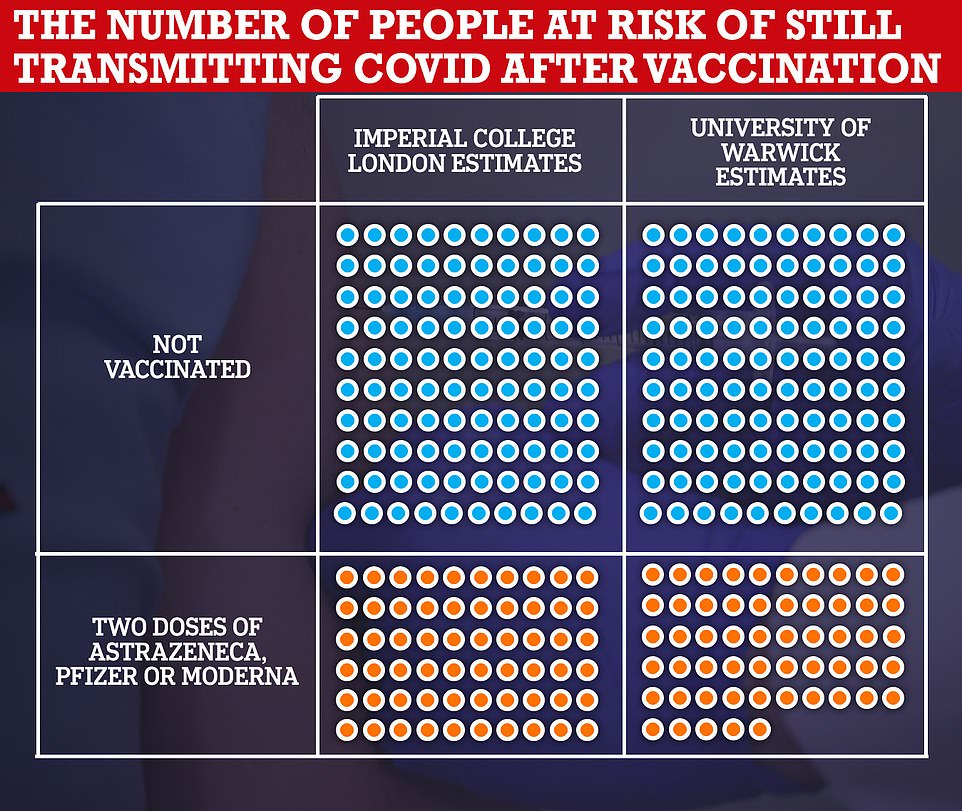
Scientists from Imperial College London estimate that the three Covid jabs dished out in the UK reduce transmission by 40 per cent, while Warwick University calculated the figure to be 45 per cent. This means of 100 unvaccinated people who would pass on the virus, just 60 to 55 of them would pass it on if they were double-jabbed
WHAT IS ‘HERD IMMUNITY’?
Herd immunity is the indirect protection from an infectious disease that happens when a population is immune either through vaccination or immunity developed through previous infection.
Effectively, it means that once people have some form of immunity, it reduces the ability of a disease to spread among the population.
Therefore, someone who has antibodies either through previous infection or vaccines, acts as a ‘barrier’ to the virus.
If you have enough ‘barriers’ then the disease cannot effectively spread through a population.
But in the case of a new virus, such as with Covid-19, the virus can spread essentially without any barriers – which can lead to a pandemic.
The World Health Organisation says it supports achieving herd immunity through vaccination, not by allowing a disease to spread through any segment of the population.
But one expert told MailOnline that Covid-19 is here to stay and that the key is reaching a ‘herd immunity threshold’.
This keeps the virus at what is known as an endemic level – where a disease is regularly found among the population but is not harmful enough to impact on society.
Keeping Covid-19 within the herd immunity threshold, which can vary particularly in winter when diseases such as flu and coronavirus spread quickly, will mean it is kept at a ‘manageable level’, the expert added.
Research shows the current crop of Covid vaccines help by increasing the antibody response to the virus – therefore heavily reducing the risk that someone can be made seriously ill.
But data is not yet available about how effective the vaccinations are at preventing transmission.
Advertisement
The concept of herd immunity was first floated last March, when SARS-CoV-2 and its clever transmission tactics were shrouded in mystery.
No10’s chief scientific adviser Sir Patrick Vallance claimed the threshold could be hit if approximately 60 per cent of the country — or 40million people — had some level of protection.
His comments sparked huge controversy, with the Government — which had no life-saving vaccines at the time — accused of planning to let hundreds of thousands die to achieve the goal.
Ministers later back-tracked on any claims of purposely seeking immunity by letting people get naturally infected.
As the virus mutated to become more contagious, mathematicians recalculated the threshold for herd immunity and sprouted figures of up to 90 per cent.
This compares to the 95 per cent figure needed to combat the spread of measles and the 80 per cent for polio.
But Covid’s true marker remains a wild guessing game, and some top experts now believe it is nigh-on impossible that it will ever be reached.
Professor Paul Hunter, an infectious diseases expert at the University of East Anglia, said immunity against SARS-CoV-2 — the virus that causes Covid — is likely to be short-lived.
Academics remain clueless over just how long either natural, or vaccine-induced, protection lasts because it’s only been circulating in humans for 18 months.
HIV is still engulfed in mystery, 40 years after the Aids pandemic.
Scientists believe immunity will be short-lived because protection from other seasonal coronaviruses only lasts for around two years.
For this reason, even if the UK was to break past the barrier and reach herd immunity, it would likely only last a short period of time.
Instead, it will keep it at an endemic level — where a disease is regularly found among the population but is not harmful enough to impact on society.
Professor Hunter said the virus will circulate for centuries, based on the last two similar pandemics.
Natural immunity is also not ‘solid’, meaning even if it lasts a long time, some who have previously had it are still susceptible to catching it again.
And the fact vaccines are not as effective at blocking transmission, especially in the face of the extra-contagious Delta variant, make herd immunity an even harder challenge.
SAGE — the expert panel which has guided No10 through the pandemic — estimates two doses of either AstraZeneca, Pfizer or Moderna’s vaccine cut the risk of transmission by up to 45 per cent.
This means of 100 unvaccinated people who would theoretically pass on the virus, 55 of them would pass it on if they were double-jabbed.
Dr Adam Kucharski, an infectious disease expert at the London School of Hygiene and Tropical Medicine and member of SAGE sub-committee Spi-M, said immunity will gradually build-up over time through a mix of natural infection and vaccines.
He told MailOnline: ‘To reach herd immunity, there needs to be enough immunity to reduce R below one, even when everyone is back to normal social interactions.
‘So the more transmissible the virus, or the less effective the vaccine in reducing transmission, the higher this threshold.
‘Vaccines against measles are very effective, with long-lasting immunity. In contrast, flu vaccines don’t reduce transmission as much, and the virus gradually evolves to reduce this effectiveness further.’
Dr Kucharski said it meant large flu outbreaks are still expected every winter, but that they eventually fizzle out as a result of natural immunity.
‘Covid vaccines worked very well against the Alpha variant (which triggered Britain’s devastating second wave in January),’ he told MailOnline.
‘It meant transmission of the Alpha variant declined dramatically as a result, but the characteristics of Delta have put us in a scenario closer to what we see with flu.’
But that doesn’t mean getting vaccinated is pointless, the country’s top researchers insist.
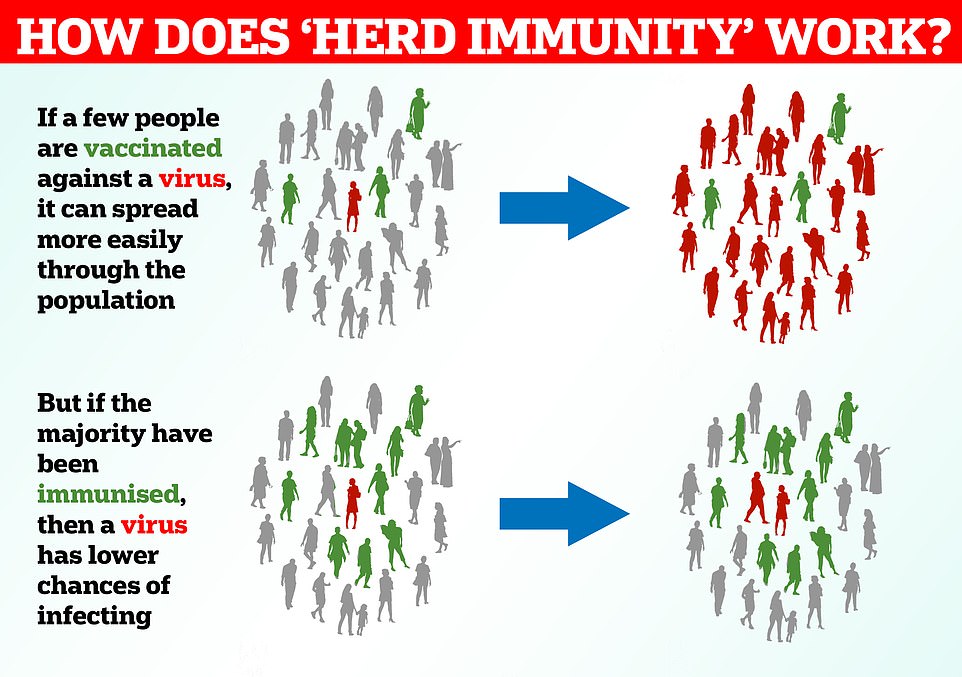
Dr Alexander Corbishley, a population health researcher at Edinburgh University, told MailOnline: ‘The vaccines are highly effective at reducing the risk of suffering severe Covid, meaning they save lives.’
Newly-appointed NHS boss Amanda Pritchard said this week that the UK roll-out has kept 52,000 people out of hospital and saved an estimated 60,000 lives.
But Dr Corbishley added: ‘Vaccines don’t prevent everyone from becoming infected and passing the disease on to someone else. The virus is still able to circulate in the population, despite high levels of vaccination or previous infection.
‘We should, therefore, vaccinate as many people as possible and accept SARS-CoV-2 will continue to circulate in the population.’
He noted that experts have been trying to control coronaviruses in animals for years, but even if a whole heard or flock is vaccinated, the infection will still circulate.
Professor James Naismith, a structural biologist at the University of Oxford, said: ‘The vaccines are safe and effective. Every day they save lives and prevent serious illness.
‘The most important thing anyone can do is persuade a vaccine-hesitant person to get vaccinated. It could save their life and/or prevent a life-long illness. It also helps protect us.’
And Dr Kit Yates, a mathematical biologist at the University of Bath, told MailOnline: ‘For Covid, the best way for people to get immunity is through vaccination.
‘Generally as immunity builds up in the population it slows the spread. The more people that have immunity, the fewer people each individual will be able to pass the disease onto.’
Vaccinating children, he added, would allow the UK to get closer to achieving some kind of herd immunity.
Fewer than 60 per cent of the UK population are double-jabbed, according to Our World in Data. And uptake is as low as 61 per cent in some groups who have been invited to get an injection and as it stands only over-16s will be eligible for the jab.
Dr Yates said: ‘If there are large demographics that are not immune then the disease can still spread freely in these groups.
‘By not offering vaccines to children, for example, we are providing a large reservoir of unprotected people in whom the virus can freely circulate.’
Professor Naismith told MailOnline herd immunity could be achieved if 83 per cent of people who could spread the virus are immune to it, because the virus would then ‘lack enough fuel’ to spread.
But there are ‘two issues’ in the way of reaching that target, he said.
Professor Naismith said: ‘People under 18 can spread the virus, so we are a way from 83 per cent of the entire population double vaccinated.’
Secondly, the vaccines ‘do not give 100 per cent of people 100 per cent immunity’, he noted.
He said: ‘A small number of vaccinated people can catch and spread the virus – but fortunately most of this small number don’t get seriously ill thanks to the vaccine.
‘This means we may need to vaccinate more than 83 per cent of the population to get herd immunity’.
Anti-vaxxer club boss, 56, dies of Covid after mocking people for getting ‘experimental’ vaccine and warning of ‘big pharma’ conspiracy in hundreds of Facebook messages
An anti-vaxxer nightclub boss has died of Covid-19 after mocking people for getting the ‘experimental’ vaccine and warning of a ‘big pharma’ conspiracy in hundreds of Facebook messages.
David Parker, 56, passed away at Darlington Memorial Hospital in County Durham on Monday despite having no underlying health conditions.
He had contracted the virus just weeks after condemning the vaccine and pharmaceutical companies in social media posts.
The family of Mr Parker, who spent a decade working as the manager of Club Louis in North Yorkshire, are said to now be urging everyone to get the jab.
It follows John Eyers, a fit and healthy 42-year-old father with a love of rock climbing and bodybuilding, dying of Covid-19 last week after refusing the vaccine.
Cambridge University graduate Leslie Lawrenson, 58, also passed away at his home in Bournemouth on July 2, just nine days after releasing footage to Facebook explaining why Covid was ‘nothing to be afraid of’.
A further 86 deaths were recorded yesterday, similar to the 85 announced at the same time last week, bringing the UK total to 130,086.
Separate figures published by the Office for National Statistics show there have now been 155,000 deaths registered in the UK where Covid-19 was mentioned on the death certificate.
Meanwhile, the Government is continuing its battle to encourage take-up of the jab among young adults after it was extended to all over-18s in mid-June. Ministers are worried that three million under-30s are yet to have one.

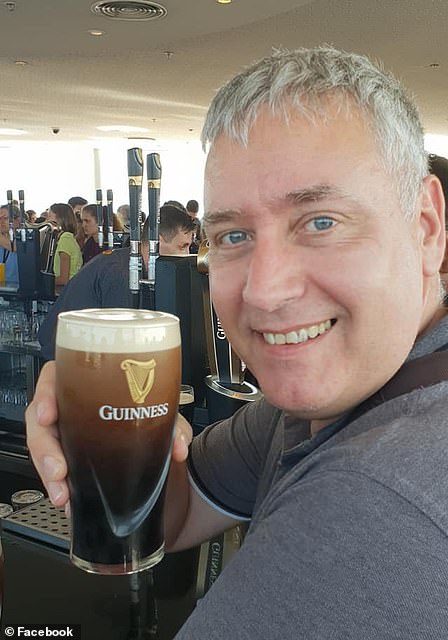
David Parker (pictured above), 56, contracted the virus and died at Darlington Memorial Hospital in County Durham on Monday, despite having no underlying health conditions
His close friend Steve Wignall, 59, told The Sun: ‘His family are devastated, they were very close and loved each other dearly.
‘But despite their terrible loss they would like it to be known that they’re encouraging everyone to please get vaccinated because they don’t want others to suffer as they are now.’
In one post on Facebook, Mr Parker shared an image of an anti-lockdown protest in London, writing ‘brilliant’ with a clapping hands emoji.
Other posts included a meme deriding people who post pictures of their vaccine card, and an image of a man wearing a tin foil hat with text written across it reading: ‘When you realise your tin foil hat has less aluminium than a vaccine’.
Mr Parker once wrote: ‘I feel the need to post information on here for people that aren’t receiving another side to the story due to media not being impartial.
‘When research is done into who finances the media it leads to the pharmaceutical companies. Who knows who is right or wrong. If I’m wrong I’ll hold my hand up but I will not stay silent.’
He also shared a link to a Facebook group called ‘The Unvaccinated Arms’, which tells its 22,220 members not to use the words ‘Covid’ or ‘vaccine’ due to ‘restrictions and posts being suppressed’ by the social media platform.
It is unclear whether Mr Parker was a member of the group.
Following his death, relatives have commented on some of the posts, with one person writing: ‘So sad to see this. RIP Uncle David, it could have saved you!’
Mr Wignall, who works as the director at Club Louis, fell ill with Covid on the same day as his colleague. He was fully vaccinated while Mr Parker had not received one dose of the vaccine.
He said: ‘He [Mr Parker] didn’t believe in it and he didn’t want it, it was out of distrust of the elite, frankly, and we couldn’t change his mind.’


Mr Parker had contracted the virus just weeks after condemning the vaccine and pharmaceutical companies (post pictured above) in social media messages
In a statement posted to social media, Club Louis said: ‘It is with enormous regret that we have to announce the passing of our manager, David Parker.
‘He was being treated for the effects of Covid but lost his struggle. On behalf of the whole Louis Family, we offer our deepest condolences to his family and friends, he will be sorely missed.
‘A pragmatic man, David would want the show to go on, so we remain open with the family’s agreement. RIP David, Mr LOUIS.’
Fellow customers and employees paid tribute to the beloved bar manager, with one commenting: ‘I just want to say thank you for giving me and my mates the best time.
‘Rest in peace David. Truly saddened and sending love to your family and friends.’
Another wrote: ‘That’s such sad news sending all my love to everyone. Worked with Dave when I worked at Louis bar and he was by far the best manager to work with.’
And a third added: ‘This is so heartbreaking. Dave was such a lovely person, and a joy to work for. Louis will never be the same without him. He’ll be missed by so many people.’
It comes after solicitor Mr Lawrenson died of Covid on July 2, having previously refused his vaccine because he believed he ‘did not need it’ and instead placed his faith in his immune system.
Wanting to record ‘the realities’ of having the virus for ‘99,9% of us’, anti-vaxxer Leslie took to social media to share two vlog posts earlier this summer.
With intermittent coughing breaking up his monologue, he explained his symptoms and described them as ‘no worse than a cold’.
He later criticised the Government’s approach to Covid-19 restrictions, saying ‘these are things we have to suffer, it’s part of living’, before urging viewers to ‘trust’ their immune systems over vaccines.
He passed away just nine days after recording his initial video.
On the same day Leslie died, his partner Amanda Mitchell, 56, who has diabetes and was also suffering with Covid, was admitted to hospital with pneumonia – she was also unvaccinated.


Cambridge University graduate Leslie Lawrenson (pictured above), 58, passed away at his home in Bournemouth on July 2, just nine days after releasing footage to Facebook explaining why Covid was ‘nothing to be afraid of’
And Mr Eyers, a construction expert from Southport, Merseyside, had been climbing the Welsh mountains and wild camping one month before his death last week, which came exactly four weeks after he tested positive.
His twin sister Jenny McCann said he was the ‘fittest, healthiest person I know’ and had thought he would only have a ‘mild illness’ if he contracted the virus.
She added that he had a ‘belief in his own immortality’. Mrs McCann said that Mr Eyers had ‘no underlying health conditions’ but did also state that he had asthma.
Before going onto a ventilator in hospital, Mr Eyers told his consultant that he wished he had been vaccinated – and died in intensive care after suffering from an infection and organ failure, leaving behind a daughter aged 19.
Advertisement
Source link : https://www.dailymail.co.uk/news/article-9869389/Britains-daily-Covid-cases-rise-7-week-31-808.html











